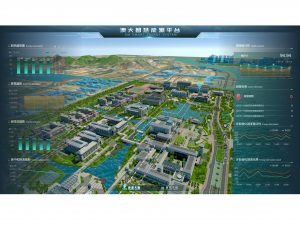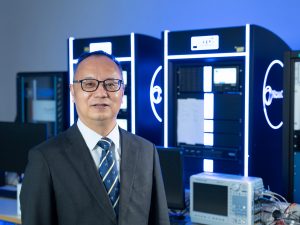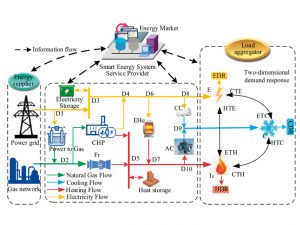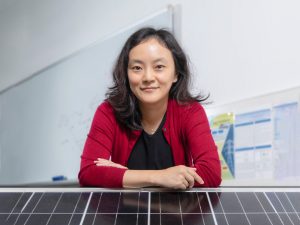Energy, the lifeblood of a city, is crucial for sustainable smart city development, and researchers in a smart energy research group at the University of Macau (UM) State Key Laboratory of Internet of Things for Smart City (SKL-IOTSC) tirelessly advance clean, low-carbon, efficient, and secure urban smart energy systems by developing essential technologies, such as new integrated energy systems, and partnering with leading energy companies to create pioneering examples for the energy sector.
Promoting Energy Transition among Cities
To achieve the low-carbon or zero-carbon operation of the energy system in smart cities of the future, researchers in the group have studied the operation and control methods of energy systems based on the Internet of Things (IoT). Chair Professor Yonghua Song, rector of UM and director of SKL-IOTSC, is an expert in power systems and the head of the smart energy research group. Prof Song explains, ‘Our group members have various interdisciplinary studies to address the pressing needs of high-density load cities, such as Macao, where there has been a substantial increase in the use of new energy, data centres, and electric vehicles. Our goal is to overcome challenges presented by the smart energy system through innovative research findings.’
As a city with a high-density load, Macao’s energy consumption structure is similar to most other cities. Studies in the laboratory show that direct energy consumption in electricity, transportation, and buildings accounts for nearly 90 per cent of Macao’s local carbon emissions. To reduce this consumption, it is necessary to use a combination of technologies such as electrification, smart grid, clean energy substitution, and low-carbon buildings.
Researchers in a project led by Prof Song have developed a demand-side load regulation system containing a high proportion of new-energy-based power systems. The new pathway for flexible load regulation capacity to follow the changes in power generation has given rise to a number of innovative theories and technologies. Not only have these key technologies found extensive applications in China (in the power grids in 11 provinces and cities) and abroad, but they are also expected to play a major role in facilitating China’s realisation of its ‘Dual Carbon’ goals and in supporting Macao’s low-carbon development strategy. According to Prof Song, UM’s research results will provide guidance to the highly developed cities along the southeast coast of China.
Smart Integrated Energy Management Platform
The research group develops smart technologies to enhance the power grid of Macao. These technologies can address Macao’s needs based on its urban characteristics, such as its high building density, high electrical loads and intensity, and many buildings. In terms of demand-side loads, the researchers are studying the incorporation of the flexible load mode into normal power system operation, so as to carry out flexible and automatic dynamic power supply for large electrical equipment, including electric vehicles and central air-conditioners. The group also conducts studies on energy storage, DC power distribution, and other urban smart grid technologies to boost the quality and capacity of electricity supply, as well as the affordability and safety of power grids.
At the same time, the group has focused on enhancing the smart energy monitoring system and methods for energy data modelling and visualisation. They built the University of Macau Smart Integrated Energy Management Platform to realise mathematical modelling of campus buildings, power systems, key equipment, and other entities. With this platform, voltage, frequency, node energy consumption, and other energy data may be monitored in real-time. Researchers have also studied topics such as smart load management, multi-energy optimal dispatching, energy usage, and safety protection, accumulating practical experience for the application of smart grids in urban scenarios in the future.
At present, SKL-IOTSC is collaborating with organisations such as Companhia de Electricidade de Macau, GREE Electric, State Power Investment Corporation, Guangdong Power Grid Corporation, and Zhejiang University to develop technologies based on IoT, big data, and artificial intelligence to realise panoramic sensing and imaging, smart operation control, abnormality monitoring, and safety protection in integrated energy systems for electricity, gas, and cooling/heating. These technologies will be applied in Macao and mainland China to further enhance the efficiency of urban energy use and ensure the safety of urban energy supply. In addition, the laboratory has been working with State Power Investment Corporation to study the optimisation of Hengqin’s regional cooling system, which will serve as a good example of energy saving and emission reduction in an urban scenario.
Research on EV Smart Charging to Reduce Carbon Emissions
The large-scale development of electric vehicles (EVs) has created a significant impact on the power grid. The laboratory therefore collaborates with CEM and Tsinghua University on a study of the long-term development of EV charging in Macao. Using advanced technologies such as new energy, artificial intelligence, IoT, and big data, researchers aim to predict the load level of EV charging in different scenarios in the future development of Macao, analyse the possible impact on the power grid, and systematically study such issues as the planning of Macao charging facilities, the optimisation of the charging operation, and the development of a full revenue cycle model. Through these efforts, researchers hope to promote EV smart charging, increase the efficiency of the power grid, and ensure the quality of the urban electricity supply.
The group also conducts research on the future business model of EV smart charging and explores the feasibility of future EV time-of-use pricing policies, with a view to promoting the development of EV and charging facilities through economic incentives and providing reference for relevant development plans. The group estimates that Macao can reduce carbon emissions by about 19 per cent through the electrification of transportation.
Building a Low-Carbon Greater Bay Area Together
UM and China Southern Power Grid recently established the Joint Laboratory of Smart Power and Energy for Carbon Neutrality, which is the first industry-academia collaboration platform in the field of energy between Guangdong and Macao. The joint laboratory is dedicated to scientific and technological research, talent training, and industrial promotion in the field of smart power and energy, in order to realise the deep integration of industry, universities, and research institutes. Dai Ningyi, assistant dean of UM’s Faculty of Science and Technology and associate professor in the Department of Electrical and Computer Engineering and SKL-IOTSC, says that the growth of EVs and the urban renewal process have increased the burden on the power supply in Macao, making it difficult to maintain consistent energy levels in older districts of the city. Through research cooperation, universities and enterprises can find solutions to these new challenges that plague smart city development and contribute to the innovative development of the energy sector in the Guangdong-Hong Kong-Macao Greater Bay Area (GBA) and across the country.
To help Macao, Shenzhen and other GBA cities meet their target of energy conservation, the laboratory has advanced IoT technologies for regulating energy efficiency to ensure the flexible distribution of resources in power grids. Its research strategy highlights four aspects, namely time-varying modelling, information interaction, regulation and control, and interaction verification. It is currently working with Shenzhen Power Supply on an industrial project announced by China Southern Power Grid for research institutions in Hong Kong and Macao, namely ‘key technologies for flexible resource assessment and interaction in IoT-based urban power grids under the double carbon goals’, with the goal of applying the research results in the GBA.
Text / Kelvin U, Trainee UM Reporter Zhu Jiangge
Photo / Jack Ho, with some provided by the interviewee
English Translation / Anthony Sou
Source: UMagazine ISSUE 27




